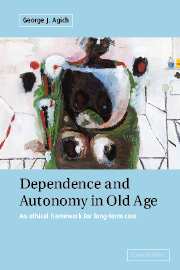2 - The liberal theory of autonomy
Published online by Cambridge University Press: 31 October 2009
Summary
Autonomy is a touchstone for much analysis and discussion in the field of bioethics. To understand its proper application in the context of long-term care, it is important to appreciate the lineage and limitations of this concept by considering its roots in the liberal theory of autonomy. Although there are significant limitations associated with the liberal theory of autonomy, most of these limitations are tractable. Liberal theory is not itself the problem, but the extension of what is primarily a political and legal theory into ethics levels the complex landscape of moral life. We need not reject liberal theory, but can confine it within its proper borders and we can supplement its contribution to ethical analysis and practice by offering a fuller and more adequate view of what it means to be an autonomous agent. Pursuing these points can entangle us in the wider debate over the modern, liberal view of the self and the political and ethical commitments of this view involving a set of controversies that are remote from the subject of this book. For this reason, this book contains only a limited allusion to this complex debate. The goal is to develop an account of autonomy compatible with liberal theory that establishes the practical utility of autonomy for the ethical analysis of long-term care. To do so, the concept of autonomy is examined in a concrete and practical way to establish a framework for re-thinking the ethics of long-term care.
- Type
- Chapter
- Information
- Dependence and Autonomy in Old AgeAn Ethical Framework for Long-term Care, pp. 13 - 50Publisher: Cambridge University PressPrint publication year: 2003



